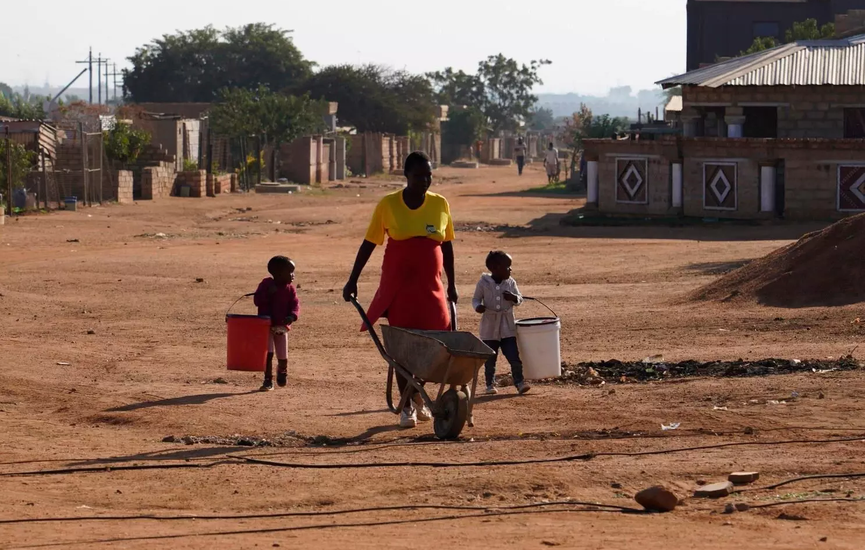Africa’s Wealth Inequality Reaches Historic Highs as Four Billionaires Surpass Half the Continent’s Population in Wealth
Africa’s wealth gap has reached staggering proportions, with just four billionaires now holding more wealth than 750 million people—half of the continent’s population—according to a new Oxfam report titled Africa’s Inequality Crisis and the Rise of the Super-Rich, released Thursday.
The report identifies Nigerian industrialist Aliko Dangote, South Africans Johann Rupert and Nicky Oppenheimer, and Egyptian businessman Nassef Sawiris as the individuals whose combined wealth totals $57.4 billion (€49.07 billion). This level of concentration, Oxfam warns, highlights the continent’s deepening crisis of inequality.
Since 2000—when Africa had no billionaires—the number of billionaires has grown to 23. Their collective wealth has surged by 56 percent over the past five years alone, reaching $112.6 billion. Meanwhile, the richest 5% of Africans now control nearly $4 trillion—more than double the combined wealth of the remaining 95%.
“This growing divide is exacerbating poverty, threatening economic development, and undermining democratic governance,” the report states.
Policy Failures and Tax Injustice
Oxfam’s analysis highlights systemic policy failures as a driving force behind this widening wealth gap. On average, African governments collect just 0.3% of GDP in wealth taxes—the lowest rate globally. This figure has declined by nearly 25% over the past decade. By contrast, governments raise almost three times more revenue through indirect taxes such as VAT, which disproportionately burden poorer households.
Moreover, countries under International Monetary Fund (IMF) and World Bank loan programs have been forced to slash public spending to meet debt obligations. In 2023 and 2024, most of these nations cut budgets for critical services such as education, healthcare, and social protection.
Illicit financial flows continue to drain the continent’s resources, with an estimated $88.6 billion leaving Africa annually through corruption, tax evasion, and illegal capital flight.
“These policies continue to favor the wealthy elite while starving essential public services of the funding they desperately need,” the report warns.
Human Cost: Rising Poverty and Political Instability
The social consequences of this extreme inequality are profound. According to Oxfam, nearly 850 million Africans are now moderately or severely food insecure—a 20 million increase since 2022. Africa now accounts for seven out of every ten people living in extreme poverty worldwide, compared to just one in ten in 1990.
The report also reveals a significant gender wealth gap: African men hold three times more wealth than women—the widest disparity globally.
In countries like Nigeria, economic inequality is mirrored in political systems. The high cost of contesting elections and rampant vote-buying have made political participation inaccessible to ordinary citizens, further entrenching elite control.
“Africa’s wealth isn’t missing—it’s being siphoned off by a rigged system that enables a small elite to amass vast fortunes while hundreds of millions are denied basic services,” said Fati N’Zi-Hassane, Director of Oxfam in Africa. “This is a policy failure of staggering proportions—unjust, avoidable, and entirely reversible.”
The Path Forward: Fair Taxation and Social Investment
To address these challenges, Oxfam is calling for bold fiscal reforms aimed at taxing the ultra-wealthy and reinvesting in public services. According to the report, a modest 1% increase in wealth taxes and a 10% rise in income tax on the richest 1% could generate $66 billion annually—equivalent to 2.29% of Africa’s GDP.
Such revenue could fully close critical gaps in free, quality education and universal access to electricity, the report notes.
There are positive examples to follow: Morocco and South Africa collect 1.5% and 1.2% of GDP respectively through property taxes—among the highest on the continent. In the Seychelles, the poorest half of the population has increased its income share by 76% since 2000, while the richest 1% has lost two-thirds of its share. The country also guarantees universal healthcare, free education, and a robust social welfare system.
Despite these models, the report warns that many African governments have recently reversed course—scaling back tax reforms, weakening labor protections, and freezing minimum wages since 2022. Without urgent and decisive action to reverse these trends, Oxfam cautions, Africa risks decades of deepening poverty, political instability, and social unrest.
